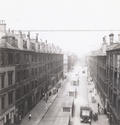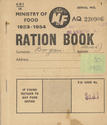 The impact of two world wars was traumatic for Glaswegians. On 4 August 1914, immediately after the outbreak of the First World War, there was a flood of young male recruits to military regiments. Because of its industrial base in shipbuilding and heavy engineering, Glasgow also had strategic importance as a centre of munitions production.
The impact of two world wars was traumatic for Glaswegians. On 4 August 1914, immediately after the outbreak of the First World War, there was a flood of young male recruits to military regiments. Because of its industrial base in shipbuilding and heavy engineering, Glasgow also had strategic importance as a centre of munitions production.
 However, the demands of war created social dislocation. For instance, the influx of munitions workers created housing shortages, forced rents up and led directly to the rent strikes of 1915. The Government was forced to intervene and peg rents at pre-war levels. There were state controls in other areas, such as transport, shipping, food and, controversially, alcohol. Over time such regulations muted patriotic enthusiasm and, along with the mounting number of casualties from the combat zones, contributed to a sense of war weariness. The Armistice of 11 November 1918, which marked the end of the conflict, was greeted with relief and euphoria.
However, the demands of war created social dislocation. For instance, the influx of munitions workers created housing shortages, forced rents up and led directly to the rent strikes of 1915. The Government was forced to intervene and peg rents at pre-war levels. There were state controls in other areas, such as transport, shipping, food and, controversially, alcohol. Over time such regulations muted patriotic enthusiasm and, along with the mounting number of casualties from the combat zones, contributed to a sense of war weariness. The Armistice of 11 November 1918, which marked the end of the conflict, was greeted with relief and euphoria.
 The subsequent peace settlement could not ease tensions in Europe. From around 1935, in response to German remilitarisation, Britain's armaments programme intensified. Strategies for civil defence were stepped up and war returned on 3 September 1939. Aerial bombing was the immediate fear in Glasgow and the night-time blackout was rigidly enforced to protect the city. The Blitz of Britain commenced in November 1940 and the Clydeside area was heavily attacked. Clydebank, next to Glasgow, was structurally devastated over the nights of 13th and 14th March 1941.
The subsequent peace settlement could not ease tensions in Europe. From around 1935, in response to German remilitarisation, Britain's armaments programme intensified. Strategies for civil defence were stepped up and war returned on 3 September 1939. Aerial bombing was the immediate fear in Glasgow and the night-time blackout was rigidly enforced to protect the city. The Blitz of Britain commenced in November 1940 and the Clydeside area was heavily attacked. Clydebank, next to Glasgow, was structurally devastated over the nights of 13th and 14th March 1941.
 The immediate threat to civilians and the need to maximise scarce resources meant that government regulations penetrated almost all areas of life. Glasgow's school children were evacuated and there was strict rationing, especially of food. Yet more than in the previous conflict, morale-boosting activities such as film going and dancing were encouraged. Victory in Europe, on 9 May 1945, was exuberantly celebrated, with the city illuminated by fireworks, bonfires and special street lamps.
The immediate threat to civilians and the need to maximise scarce resources meant that government regulations penetrated almost all areas of life. Glasgow's school children were evacuated and there was strict rationing, especially of food. Yet more than in the previous conflict, morale-boosting activities such as film going and dancing were encouraged. Victory in Europe, on 9 May 1945, was exuberantly celebrated, with the city illuminated by fireworks, bonfires and special street lamps.